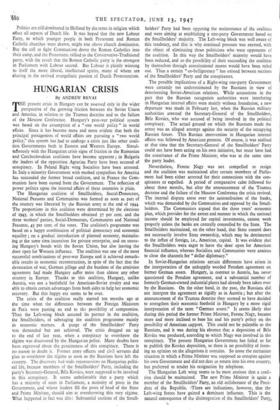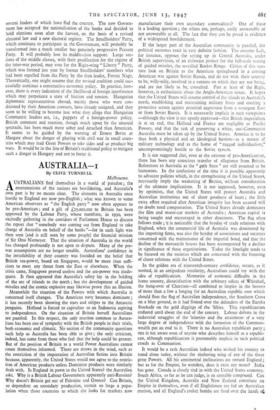HUNGARIAN CRISIS
By ANDREW REV/it rIIHE present crisis in Hungary can be assessed only in the wider perspective of the growing friction between the Soviet Union end America, in relation to the Truman doctrine and to the failure of the Moscow Conference. Hungary's post-war political system was based on the assumption of a " one world policy " in world affairs. Since it has become more and more evident that both the principal protagonists of world affairs are pursuing a " two world policy," this system has had to undergo a crisis just like other coali- tion Governments both in Eastern and Western Europe. Simul- taheously with the Hungarian crisis signs of friction in the Rumanian and Czechoslovakian coalitions have become apparent ; in Bulgaria the leaders of the opposition Agrarian Party have been accused of conspiracy. In Poland Right wing Socialists have been arrested. In Italy a minority Government with marked sympathies for America has succeeded the former broad coalition, and in France the Com- munists have been ousted from the Government. The reflection of power politics upon the internal affairs of these countries is plain.
The Hungarian coalition of Smallholders, Social-Democrats, National Peasants and Communists was formed as soon as part of the country was liberated by the Russian army at the end of 1944. The proportions in this coalition were determined by the elections of 1945, in which the Smallholders obtained 57 per cent. and the three workers' parties, Social-Democrats, Communists and National Peasants, 43 per cent. of the votes. The coalition's programme was based on a happy combination of political democracy and economic equality ; on a gradual introduction of planned economy, maintain- ing at the same time incentives for private enterprise, and on stress- ing Hungary's bonds with the Soviet Union, but also leaving the door open for Western influence. The coalition was one of the most successful combinations of post-war Europe and it achieved remark- able results in economic reconstruction, in spite of the fact that the devastation of war, German pillage and the burdens of the armistice agreement had made Hungary suffer more than almost any other country in Europe. Thanks to this coalition, Hungary, unlike Austria, was not a battlefield for American-Soviet rivalry and was able to obtain certain advantages from both sides to help her economic recovery. But this happy era seems to be over.
The crisis of the coalition really started ten months ago at the time when the differences between the Foreign Ministers in Paris were putting an end to the possibility of compromise. Then the Left-wing block accused its partner in the coalition, the Smallholders, of sabotaging the coalition programme mainly in economic matters. A purge of the Smallholders' Party was demanded but not achieved. The crisis dragged on up to the end of last year, when a conspiracy to overthrow the regime was discovered by the Hungarian police. Many doubts have been expressed about the genuineness of this conspiracy. There is no reason to doubt it. Former army officers and civil servants did plan to overthrow the regime as soon as the Russians have left the country. The discovery had wide repercussions on Hungarian politi- cal life, because members of the Smallholders' Party, including the party's Secretary-General, Bela Kovacs, were supposed to be involved in this conspiracy. It seems unbelievable that a party which has a majority of seats in Parliament, a majority of posts in the Government, and whose leaders fill the posts of head of the State and Prime Minister, should aim at overthrowing this very regime. What happened in fact was this : Substantial sections of the Small- holders' Party had been opposing the maintenance of the coalition and were aiming at establishing a one-party Government based on the Smallholders' majority. The Left-wing block was well aware of this tendency, and this is why continual pressure was exerted, with the object of eliminating those politicians who were opponents of the coalition. In this way the Smallholders' majority would have been reduced, and so the possibility of their succeeding the coalition by themselves through constitutional means would have been ruled out. Thus a certain " co-belligerency " has existed between sections of the Smallholders' Party and the conspirators.
The possible implications of a Right-wing one-party Government were certainly not underestimated by the Russians in view of deteriorating Soviet-American relations. While accusations in the past that the Russian occupation authorities were interfering in Hungarian internal affairs were mainly without foundation, a new departure was made in February last, when the Russian military authorities arrested the Secretary-General of the Smallholders, Bela Kovacs, who was accused of being involved in the political conspiracy. The actual ground on which the Russians made the arrest was an alleged attempt against the security of the occupying Russian forces. This Russian intervention in Hungarian internal affairs was followed by American protests. Of course, it was realised at that time that the Secretary-General of the Smallholders' Party could not have been acting on his own initiative, but must have had the connivance of the Prime Minister, who was at the same time the party leader.
Nevertheless, Ferenc IsTagy was not compelled to resign and the coalition was maintained after certain members of Parlia- ment had been either arrested for their connections with the con- spirators or expelled. A period of comparative calm followed for about three months, but after the announcement of the Truman doctrine and the failure of the Moscow Conference the crisis revived. The internal dispute arose over the nationalisation of the banks, which was demanded by the Communists and opposed by the Small- holders. The Communists argued that the three years' economic plan, which provides for the extent and manner in which the national income should be employed for capital investments, cannot work properly unless the banks are centrally controlled by the State. The Smallholders maintained, on the other hand, that State control does not necessarily involve State ownership, which may be detrimental to the influx of foreign, i.e., American, capital. It was evident that the Smallholders were eager to leave the door open for American financial influence, whereas Socialists and Communists were anxious to close the channels for " dollar diplomacy."
In Soviet-Hungarian relations certain differences have arisen in the interpretation of the unhappily worded Potsdam agreement on former German assets. Hungary, in contrast to Austria, has never questioned the Potsdam agreement, and a substantial number of formerly German-owned industrial plants had already been taken over by, the Russians. On the other hand, in the past, the Russians did not interpret the agreement as rigidly as in Austria ; but after the announcement of the Truman doctrine they seemed to have decided to strengthen their economic foothold in Hungary by a more rigid interpretation of the term " German assets." It seems likely that during this period the fanner Prime Minister, Ferenc Nagy, became more and more inclined to base his and his party's policy on the possibility of American support. This could not be palatable to the Russians, and it was during his absence that a deposition of Bela Kovacs was produced, according to which Nagy was involved in the conspiracy. The present Hungarian Government has failed so far to publish the Kovacs deposition, so there is no possibility of form- ing an opinion on the allegations it contains. So arose the ruritanian situation in which a Prime Minister was supposed to conspire against his own Government and did not dare to return into his own country, but preferred to tender his resignation by telephone.
The Hungarian Left wing seems to be most anxious that a coali- tion should be maintained. The new Prime Minister is again a member of the Smallholders' Party, an old collaborator of the Presi- dent of the Republic, iThere are indications, however, that the Left-wing forces have gained a dominant influence. This is the natural consequence of the disintegration of the Smallholders' Party,, several leaders of which have fled the country. The new Govern- ment has accepted the nationalisation of the banks and decided to hold elections soon after the harvest, on the basis of a revised electoral law and a new electoral register. The Smallholders' Party, which continues to participate in the Government, will probably be transformed into a much smaller but genuinely progressive Peasant Party. It will probably lose its middle-class support. Large sec- tions of the middle classes, with their predilection for the regime of the inter-war period, may vote for the Right-wing "Liberty " Party, which was formed last year by former Smallholders' members who had been expelled from the Party by the then leader, Ferenc Nagy. Theoretically, one might assume that the revised coalition could suc- cessfully continue a constructive economic policy. In practice, how- ever, there is every indication of the likelihood of foreign interference which may perpetuate a state of friction and tension. Hungarian diplomatic representatives abroad, mainly those who were con- ditioned by their American contacts, have already resigned, and they seem to be willing to become just what they allege that Hungarian Communist leaders are, i.e., puppets of a foreign-power policy. British comment and reaction, though much upset by the unusual spectacle, has been much more sober and detached than American. It seems to be guided by the warning of Ernest Bevin at Margate about the danger of playing with civil war in small coun- tries which may lead Great Powers to take sides and so produce big wars. It would be in the line of Britain's traditional policy to mitigate such a danger in Hungary and not to foster it.



































 Previous page
Previous page